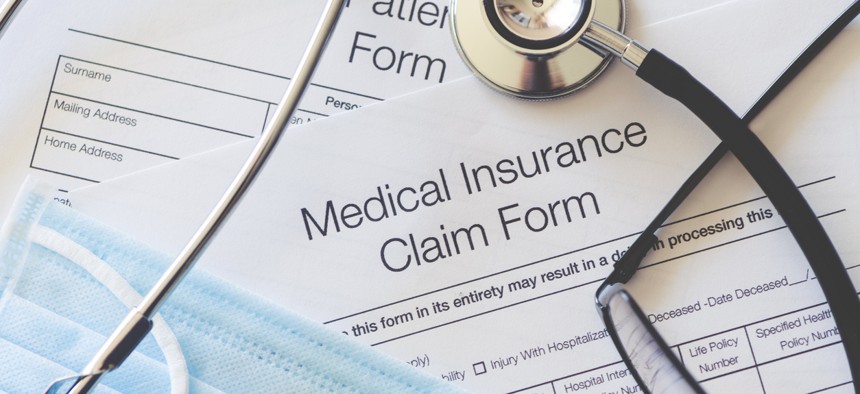More than $20M in Federal Funds Available for State-Based Insurance Marketplaces to Make Improvements

istock.com/courtneyk
The Centers for Medicare & Medicaid Services funding will help improve access and update systems to reflect new eligibility thresholds, state officials said.
The federal Centers for Medicare & Medicaid Services announced that $20 million in American Rescue Plan funding would be available to modernize and improve state-based insurance marketplaces. In Washington, D.C., health officials were elated.
“We’ve been counting the days,” said Mila Kofman, executive director of DC Health Link, the district-run insurance marketplace.
The money will be split into “up to 21 cooperative agreement grants” and is meant to be used by states to “help modernize or update their systems, programs, or technology to comply with federal marketplace requirements,” the federal agency said in a statement.
Eligible entities include D.C. and the 14 states that run insurance marketplaces, as well as six states that use the federally run HealthCare.gov platform to determine eligibility and process enrollment. Applications are due July 20, with grant distribution expected to begin in September.
“Our state-based marketplaces are the gateway to quality, affordable health care for millions of consumers and these investments will make it even easier to sign up for coverage,” CMS Administrator Chiquita Brooks-LaSure said in a statement. “This funding available to states will help them to provide consumers with swift eligibility determinations and enrollment into comprehensive health care plans.”
The money comes at a good time, Kofman said, as state-based marketplaces, including D.C.’s, implemented a multitude of changes to their enrollment and eligibility processes during the pandemic. Last year, as Covid-19 cases began spiking, district officials opened the exchange for enrollment to allow uncovered residents to obtain insurance, even though it was past Jan. 31, when enrollment traditionally concludes.
“We also adopted a special Covid-19 enrollment period that allowed people to have their policies start sooner,” Kofman said. “We wanted to make sure there were no barriers to anyone who wanted to come in, and we saw huge spikes in enrollment as a result.”
As of May 24 last year, according to internal data, 2,654 people had enrolled in insurance plans via DC Health Link, up from 1,744 by that date in 2019—a 52% spike. As of June 20, 101,174 residents were enrolled, either via individual or small-group insurance plans.
Those changes were relatively easy to implement from a logistical standpoint, Kofman said, as the district’s exchange uses a cloud-based system that allows for quick updates to individual modules. But there were myriad changes to make that continued into this year, thanks to provisions in the American Rescue Plan that granted lower premiums via tax credits to individuals under certain income thresholds and expanded eligibility for less expensive health plans.
Kofman’s team worked to make those changes seamless for existing customers, implementing new technology that automatically calculated savings based on income information and then applied lower premiums to those accounts. Those updates were all made relatively quickly, but the process still required staff hours and training, some of which D.C. hopes to recoup through the CMS funding.
“Our system is very modular and it enables us to do things pretty quickly, but I still can’t turn the switch on overnight,” Kofman said. “It requires a lot of staff time. We had to update our IT systems and we’re still actually making improvements to the update.”
There were non-technological costs as well, Kofman said, including training for call center employees and “navigators,” who typically help residents register for plans in person but had to switch to virtual sessions during the pandemic.
“The fact that the CMS directive recognizes that it’s not just IT, and that state-based marketplaces had invested a lot into non-IT implementation is also great,” she said. “We will be asking to get the funding for those things as well.”
States to Apply for Funds
Other states had similar plans. Libby Calum, a spokeswoman for Minnesota’s MNsure exchange, said via email that the state planned to apply for money “to help cover the costs of the system changes we made in order for Minnesotans to benefit from the changes to the [Affordable Care Act] in the American Rescue Plan Act.”
Maryland will also apply, though officials “are still working on a detailed plan,” Michele Eberle, executive director of the state’s Health Benefit Exchange, said via email. “We are delighted that CMS is willing to invest in supporting us in our efforts to get Marylanders enrolled in health coverage.”
The funding is a balm, Kofman said, not only because it will help pay for necessary changes to state exchange infrastructure, but because it signifies an acknowledgement from federal officials that the work is ongoing and will require support.
“There’s a recognition that it’s not a one-time expense, and that state-based marketplaces are still doing a whole lot of work,” she said. “To be able to get reimbursed for some of this is huge, because we had to use our existing funding for ARP implementation. Recovering some of those funds means we can do the things we had planned to do before ARP and the pandemic.”
Kate Elizabeth Queram is a senior reporter for Route Fifty and is based in Washington, D.C.
NEXT STORY: Enrollment in Health Insurance Lags Among Latino Children





